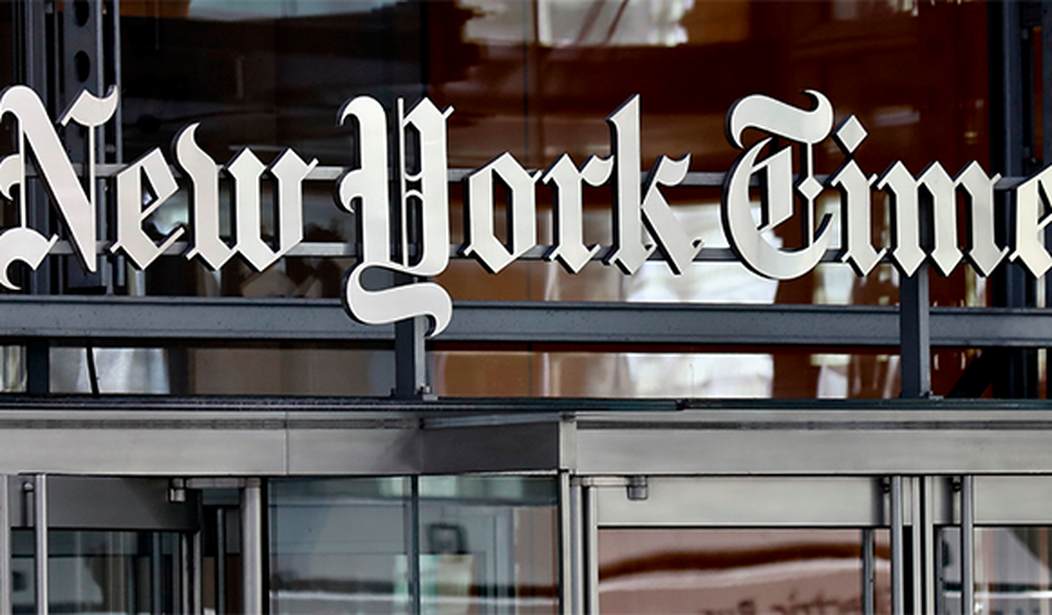The management at The New York Times must be grateful for the cover afforded by Christmas and the New Year. As the paper of record is grappling with a massive journalistic scandal the holidays can serve as a significant distraction while they weather this storm. Altering their practices and working to avoid this kind of public humiliation is not high on the priorities list, it appears, as more information is coming out to show that spin, rather than repair, seems to be the method of approach to this scandal.
If unfamiliar, the problems surround a highly regarded podcast series the Times produced in 2018, entitled “Caliphate.” It covered a Canadian national named Shehroze Chaudhry who became radicalized in ISIS and traveled to Syria to become an executioner in the terrorist organization. Upon his escape and subsequent return to Canada he was approached by the Times and his story was made into both news items and then ultimately developed into the podcast series. (I detailed much of the scandal last week.)
This fall the man at the center of the story was investigated by Canadian authorities and charged with perpetrating a hoax; there was no evidence proven of any of the details he had been providing. The Times had to issue massive corrections to the series, and retract huge segments from the broadcast. The reporter behind the series, Rukmini Callimachi, has been removed from terrorism coverage entirely and the paper has since returned its Peabody Award.
In the wake of this major development, however, there are signs the Times is not looking to repair the flaws in its system that led to this significant journalistic lapse. NPR has reported that one of the bigger names at the paper - podcast star Michael Barbaro - has been lobbying journalists to downplay their coverage of this scandal.
One managing editor has declared the moves made by the Times do constitute a retraction, at least in reference to the portions covering the disgraced subject of the show.
Recommended
When Barbaro pressed Erik Wemple of the Washington Post, who has covered the story and its fallout, to stop referring to the Times’ actions as a “retraction,” the columnist was not swayed. "They should embrace that they retracted it instead of ... tiptoeing around this idea."
Instead they persist in not being completely forthcoming and are attempting PR damage control.
As a sign of addressing the problem Times executive editor Dean Baquet sat down to detail how the paper was handling the crisis on the popular Times podcast “The Daily,” hosted by Barbaro. While there was plenty of apologetic notices and issuing of corrective language, what was missing from this editorial coming to Jesus moment was how much Barbaro himself was connected to the scandal.
Many of those on the technical side of “The Daily” went to also work on the “Caliphate” series. Beyond that, the first episode of “Caliphate” was featured as an episode of “The Daily,” with Barbaro serving as the voice-over introduction. And the host has an even deeper personal connection; he is engaged to Lisa Tobin, producer on the now-disgraced podcast series.
These are some rather deep connections that would warrant disclosure by Barbaro while he was hosting an episode addressing the journalistic problems behind the show. One of the major creators on “Calliphate” was Andy Mills, and while Callimachi has been reassigned, Mills was allowed to return to producing “The Daily,” where he recently was a fill-in host. Despite these ties Barbaro acted as if he were merely a passive outside observer, and in the wake, he is conducting efforts to tamp down journalists from covering what is a major breach of media ethics by The Times.
This is a bad calculation, considering the details which emerged following the scandal. When the Canadian case was breaking the Times called a meeting with managing editors and other writers, and it was shown that when some on staff went to management with concerns over Callimachi’s reporting those issuing concerns were admonished by the editors. This was not a novel occurrence; past stories by Callamachi had been challenged by reporters in the Middle East and similar responses followed.
Callamachi was regarded as a star of sorts, and the podcast was both regarded as a major broadcast and a medium that elided normal editing standards. For Callimachi to be removed entirely from covering the subject for which she has become a star journalist is a major maneuver. Dean Baquet told NPR she could no longer be regarded as a trustworthy source on the subject of terrorism.
Despite all of this there is an attempt to still alter perceptions. Claims that retractions have not taken place when a major segment of “Caliphate” has essentially been gutted, major awards rescinded, and the reporter force behind the show being stripped of her subject matter makes this laughable. That Mike Barbaro refused to acknowledge his deep ties to the show while hosting the retractions on air only shows the reticence to fix the underlying issues.
Maybe the biggest sign of the lack of vigor to address the problem is in the act of pressuring reporters to not cover the scandal so intently. A journalist encouraging other journalists not to engage in journalism is about the best example you can find as to how something this disastrous could take place at The New York Times.

























Join the conversation as a VIP Member